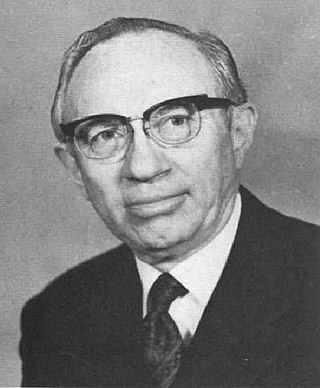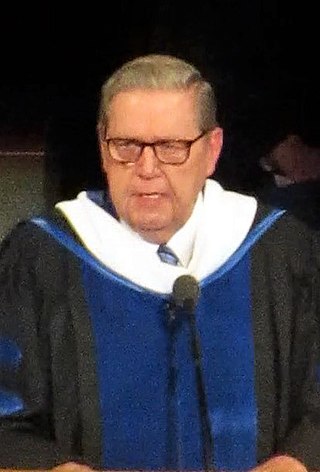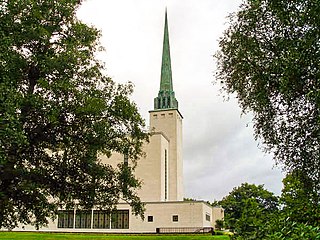
Brigham Young University (BYU) is a private research university in Provo, Utah, United States. It was founded in 1875 by religious leader Brigham Young and is sponsored by the Church of Jesus Christ of Latter-day Saints.

Gordon Bitner Hinckley was an American religious leader and author who served as the 15th president of the Church of Jesus Christ of Latter-day Saints from March 1995 until his death in January 2008 at age 97. Considered a prophet, seer, and revelator by church members, Hinckley was the oldest person to preside over the church in its history until Russell M. Nelson surpassed his age in 2022.

Jeffrey Roy Holland is an American educator and religious leader. He served as the ninth president of Brigham Young University (BYU) and is the acting president of the Quorum of the Twelve Apostles of the Church of Jesus Christ of Latter-day Saints. As a member of the Quorum of the Twelve, Holland is accepted by the church as a prophet, seer, and revelator. Currently, he is the third most senior apostle in the church.

Missionary Training Centers (MTC) are centers devoted to training missionaries for the Church of Jesus Christ of Latter-day Saints. The flagship MTC is located in Provo, Utah, adjacent to the campus of Brigham Young University (BYU), a private university owned and operated by the church.

The Kirtland Temple is the first temple built by adherents of the Latter Day Saint movement, located in Kirtland, Ohio, and dedicated in March 1836. Joseph Smith, the movement's founder, directed the construction following a series of reported revelations, and the temple showcases a blend of Federal, Greek Revival, and Gothic Revival architectural styles. It was added to the National Register of Historic Places in 1969 and named a National Historic Landmark in 1977. Prior to March 5, 2024, the temple was owned and operated by Community of Christ for over a century before ownership transferred to the Church of Jesus Christ of Latter-day Saints.

In the Latter Day Saint movement, a temple is a building dedicated to being a house of God and is reserved for special forms of worship. A temple differs from a church meetinghouse, which is used for weekly worship services. Temples have been a significant part of the Latter Day Saint movement since early in its inception. Today, temples are operated by several Latter Day Saint denominations. The most prolific builder of temples of the Latter Day Saint movement is the Church of Jesus Christ of Latter-day Saints. The LDS Church has 350 temples in various phases, which includes 193 dedicated temples, 51 under construction, and 106 others announced. Several others within the movement have built or attempted to build temples. The Community of Christ operates one temple in the United States, which is open to the public and used for worship services, performances, and religious education. Other denominations with temples are the Apostolic United Brethren, the Church of Christ, the Fundamentalist Church of Jesus Christ of Latter-Day Saints, and the Righteous Branch of the Church of Jesus Christ of Latter-day Saints.

The London England Temple is the twelfth operating temple of the Church of Jesus Christ of Latter-day Saints and is located in Newchapel, Surrey, England. Despite its name, it is not located within London or Greater London.

Ensign College is a private college in Salt Lake City, Utah. The college is owned by the Church of Jesus Christ of Latter-day Saints and operates under its Church Educational System. It also includes an Institute of Religion and is accredited by the Northwest Commission on Colleges and Universities.

The Provo Utah Temple was a temple of the Church of Jesus Christ of Latter-day Saints located in Provo, Utah, just north of Brigham Young University (BYU). The intent to build the temple was announced on August 14, 1967, by Hugh B. Brown and N. Eldon Tanner. The church's temples are a sacred space where church members make covenants and perform ordinances for themselves and their deceased ancestors. The temple was designed by architect Emil B. Fetzer and was dedicated in 1972 as the church's seventeenth constructed and fifteenth operating temple. It was the sixth temple built in Utah, and the first in both Utah County and Provo.
The Marriott School of Business is the business school of Brigham Young University (BYU), a private university owned by the Church of Jesus Christ of Latter-day Saints and located in Provo, Utah, United States. It was founded in 1891 and renamed in 1988 after J. Willard Marriott, founder of Marriott International, and his wife Alice following their $15 million endowment gift to the school.

Cecil Osborn Samuelson Jr. is an American retired rheumatologist and professor of medicine who served as the 12th president of Brigham Young University (BYU) from 2003 to 2014. Samuelson is an emeritus general authority of the Church of Jesus Christ of Latter-day Saints, a former dean of the school of medicine at the University of Utah, and a former senior vice president of Intermountain Health Care (IHC). While he was president at BYU, Samuelson pushed professors and students to raise their expectations and encouraged mentored learning. During his presidency, student enrollment limits stayed constant, new sports coaches were hired, new buildings were built, and a hiring freeze during the Great Recession reduced faculty.

The finances of the Church of Jesus Christ of Latter-day Saints are not a matter of public record. In the absence of official statements, people interested in knowing the LDS Church's financial status and behavior, including both members of the LDS Church and others, have attempted to estimate or guess. According to the church, their funding comes from the donations of its members and the principal expense is in constructing and maintaining facilities.
John Kay Carmack has been a general authority of the Church of Jesus Christ of Latter-day Saints since 1984. He is currently an emeritus general authority and was the managing director of the church's Perpetual Education Fund from 2001 to 2012.
The history of Brigham Young University (BYU) begins in 1875, when the school was called Brigham Young Academy (BYA). The school did not reach university status until 1903, in a decision made by the school's board of trustees at the request of BYU president Benjamin Cluff. It became accredited during the tenure of Franklin S. Harris, under whom it gained national recognition as a university. A period of expansion after World War II caused the student body to grow many times in size, making BYU the largest private university of the time. The school's history is closely connected with its sponsor, The Church of Jesus Christ of Latter-day Saints.
The main campus of Brigham Young University sits on approximately 560 acres (2.3 km2) nestled at the base of the Wasatch Mountains and includes 311 buildings. The buildings feature a wide variety of architectural styles, each building being built in the style of its time. The grounds and landscaping of the campus won first place in 2005 in America in Bloom's campus division. Furthermore, views of the Wasatch Mountains, can be seen from the campus. BYU's Harold B. Lee Library, which The Princeton Review ranked as the #1 "Great College Library" in 2004, has approximately 8½ million items in its collections, contains 98 miles (158 km) of shelving, and can seat 4,600 people. The Spencer W. Kimball Tower is home to several of the university's departments and programs and is the tallest building in Provo, Utah. Furthermore, BYU's Marriott Center, used as a basketball arena, can seat almost 18,000 and is one of the largest on-campus arenas in the nation.

The N. Eldon Tanner Building, also known as the TNRB, is a building that houses classrooms and administrative offices for the Marriott School of Business on the Brigham Young University (BYU) campus in Provo, Utah, United States.

The Provo Tabernacle was a tabernacle of the Church of Jesus Christ of Latter-day Saints from 1898 to 2010 in downtown Provo, Utah, United States. It was a historic icon of Provo and had been home to many religious and cultural events. All but the outer walls of the building were destroyed by fire in December 2010. The LDS Church preserved the remaining outer walls and built a new foundation and interior as part of the Provo City Center Temple, completed in 2016.

The Provo City Center Temple is a temple of the Church of Jesus Christ of Latter-day Saints on the same site as the former Provo Tabernacle in Provo, Utah. Completed in 2016, the temple utilizes much of the external shell of the tabernacle, all that remained of the original building after a fire in December 2010.
















